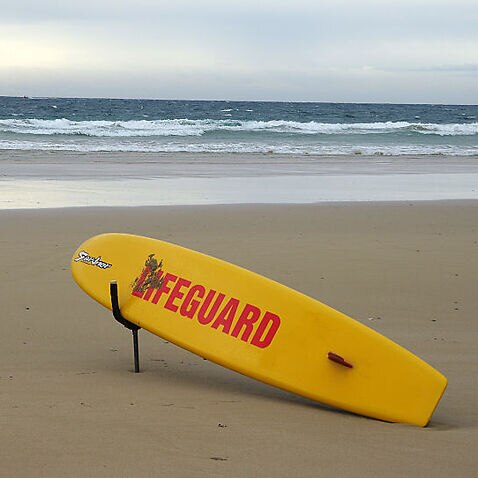Turnbull government pledges $3 million to surf lifesavers to curb drowning deaths

READ MORE
Prime Minister Malcolm Turnbull said water safety needs to be a priority to reduce the number of drowning deaths.
Despite 11,000 water rescues performed by lifesavers in the last year, 300 people lost their lives including 18 in December alone.
Speaking at the North Bondi Surf Club, Mr Turnbull reflected on his experience nearly drowning and how he was rescued by his father.
“It is so enticing, particularly on a hot day,” he said.
“It just look likes heaven out there. And it is. But it can very rapidly become a dangerous environment.”
The extra $3 million comes on top of the $15 million spent by the federal government over the past five years to support lifesaving clubs.

Funding will buy drones
Part of the new funding will go towards the purchase of drones to assist in spotting swimmers in trouble.
“It’s one very good way to find out what is going on out the back, past that break, whether there is somebody out there who is struggling,” Mr Turnbull said.
He said the drones would be an improvement on the old method of using a belt.
“You needed the line because by the time you go to the patient, you were so exhausted. You are in almost as trouble as him. All of that technology is vital,” the prime minister said.
Part of the funds will also go towards swim education and first aid technique.
Mr Turnbull said migrants were a vulnerable population that needed to be targeted.
“We have to make sure wherever there is a vulnerability in any community or group – you know lack of knowledge, lack of swimming expertise, lack of awareness – that that is addressed. And that is what part of this money is going towards,” he said.
Mr Turnbull said Austswim programs had been making inroads into migrant communities and that work needed to continue.
“All of these programs are focused on ensuring that people learn how to swim. Austswim is doing a fantastic job in that regard,” he said.

Parents urged to ensure swim education of kids
Sport Minister Bridget McKenzie urged parents to take responsibility for ensuring their kids know how to swim.
“We’re Australian, we’re known for our iconic beaches. The image of the Australian surf lifesaver is recognised worldwide,” she said.
“But it does hide the dark reality for us in this nation that our waterways are not always safe places to be.”
Ms McKenzie told reporters it was important for parents in migrant families to educate their children on how to swim.
She used Australian freestyle swimmers brother-and-sister duo Ilsa and John Konrads as an example of how essential swim safety was. They lived in a small town of 900 outside of Wagga Wagga in New South Wales.
“A new migrant family landed at that community and was very, very fearful that their Eastern European children would drown in the one of the myriad of dams in that community because father worked out on farms,” Ms McKenzie said.
“So as a matter of urgency they got young Ilsa and young John Konrads to learn to swim. They went on to break 38 world records – that brother-and sister-team that learnt how to swim in that small country town at that pool.
“All because their parents recognised the inherent danger of the waterways,and the essential need for all of us to ensure that our kids can learn to swim.”

Situation can rapidly escalate: surf lifesavers
Surf Life Saving New South Wales is urging beachgoers to take precautions during New Year’s Day – one of the biggest patrol days for lifesavers.
The death toll from coastal drownings in the state has increased to 19 since July. The latest incident involved a Parramatta man in his 30s who got stuck in a rip while swimming with his brother on the NSW Central Coast.
Lifesavers near the patrolled area of Frazer Park beach managed to pull the brothers out of the water.
Paramedics were able to treat the other brother, but the man in his 30s could not be revived.
Surf Life Saving New South Wales chief executive Steven Pearce urged swimmers to stay between the flags and avoid entering the water under the influence of alcohol or drugs.
“Our number one priority is to ensure the safety of the beach-going public, and while our volunteers and support teams will be ready in the event of emergencies, we’d ask the public to make the job of lifesavers and lifeguards as easy as possible by looking out for their own and others safety,” he said.
Ms McKenzie also advised swimmers to never swim alone, to always wear a life jacket, and to know first aid and CPR.
The Burundian community in South Australia earlier this month backed calls by Surf Life Saving South Australia for more government-funded swim education targeted at migrants and tourists.
Settlement Guide: how to stay safe at the beach this summer
The calls came after two drownings involving migrants over an eight-day period in early December.
A 15-year-old Burundi boy drowned in a birthday party tragedy at Glenelg Beach 18 December, eight days after 15-year-old Indian student also drowned.
Australia’s creeks and waterways claimed more lives than the beach in 2016/17, according to Australian Medical Association president Michael Gannon.
Nearly 70 people died in creeks and waterways. This compares to 50 deaths at the beach and more than 40 drowning deaths in swimming pools.
Beachsafe: Surf Life Saving’s guide to conditions and lifesaving services at Australian beaches
Article source: http://www.espncricinfo.com/australia-v-england-2017/content/story/1129214.html?CMP=OTC-RSS
Comments
Post a Comment